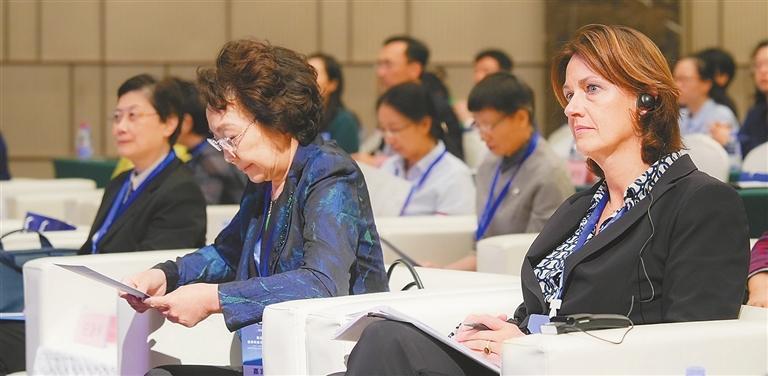
Attendees listen to speeches at the Women Scientists Forum at Shenzhen L.gem Hotel in Futian District on Thursday. A parallel forum of the fifth World Science and Technology Development Forum, the forum explored the responsibility of and international collaboration among female scientists.

A scene of the Future Industrial Development Forum in Guangming District on Thursday. Courtesy of the organizer
Cutting-edge technologies such as quantum, new materials, artificial intelligence, synthetic biology, and blockchain were highlighted at the Future Industrial Development Forum held Thursday at the Cloud Park International Conference Center in Guangming District.
The forum, themed on new trends and forward-looking layout of future industrial development, is one of the parallel forums of the fifth World Science and Technology Development Forum. It included a keynote report and roundtable sessions to discuss topics such as advanced technologies, and sci-tech management, policies, and innovation.
Yu Dapeng, an academician from the Chinese Academy of Sciences and a professor at the Southern University of Science and Technology (SUSTech), noted in his keynote report that the most successful application of quantum mechanics is modern electronic information technology.
According to Yu, quantum computing has unrivalled computing power and can solve problems that classic computers can't. He observed that building a quantum computer is more urgent than studying quantum computing.
Tang Benzhong from the Chinese University of Hong Kong, Shenzhen (CUHK-Shenzhen) shared at the forum the huge application prospects of aggregation-induced emission (AIE), a concept he coined in luminescence.
AIE refers to a photophysical effect that the luminescence of aggregates is stronger than that of the dispersed state. Tang's labs are spearheading AIE research globally.
Tang mentioned that one of AIE's commercial applications in daily life is detecting formaldehyde. In addition, it can be applied to check the freshness of food such as salmon.
During a roundtable session Thursday, Haeng-A Seo, chief representative of the Korea-China Science & Technology Cooperation Center, suggested that in the future, China and South Korea can enhance cooperation in green technology, sci-tech, health care, and agriculture.
She also called for more cooperation between institutions, universities, and companies from the two countries through exchange programs.
The forum, held simultaneously online, attracted over 300 participants from universities, institutions, enterprises, and think tanks on the spot.



